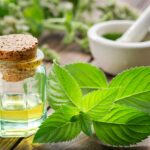The question “Does herbal tea have caffeine?” is one that many herbal tea drinkers ponder. As herbal teas are derived from plants other than Camellia sinensis, the plant used to make black, green, white, oolong, and pu-erh teas, it is often assumed they contain no caffeine. However, this assumption is not entirely accurate. While many popular herbal tea varieties are truly caffeine-free, some contain small amounts of natural caffeine. This article will explore the topic of caffeine in herbal tea in depth.
Understanding Caffeine
Before examining which herbal teas contain caffeine, it’s important to understand what caffeine is. Caffeine is a central nervous system stimulant that occurs naturally in over 60 plants worldwide. It is most concentrated in the seeds, leaves, and fruit of these plants. Caffeine works by blocking the effects of adenosine, a neurotransmitter that promotes drowsiness. By blocking adenosine receptors in the brain, caffeine makes us feel more alert and energetic. Even small amounts of caffeine have physiological and psychological effects on the human body.
Types of Herbal Tea
Caffeine-Free Herbal Teas
Many popular herbal teas like chamomile, peppermint, and rooibos are truly caffeine-free. These varieties are derived from plants like Matricaria chamomilla, Mentha piperita, and Aspalathus linearis which do not naturally contain caffeine. Sipping these types of herbal teas will provide hydration and various antioxidants without any stimulant effects.
Herbal Teas with Caffeine
However, some herbs commonly used in tea do naturally contain small amounts of caffeine due to their genetic makeup. Plants in the citrus family like orange and tangerine peel contain up to 30mg of caffeine per 8oz serving. Other herbal teas producing mild levels of caffeine include yerba mate, guarana, and green tea. Yerba mate sourced from Ilex paraguariensis has about 20-30mg caffeine per 8oz, guarana from Paullinia cupana has 32-128mg, and green tea of course contains 27mg naturally.
Does Herbal Tea Have Caffeine?
The answer is – it depends. Different herbal teas will vary widely in their caffeine content depending on the specific plant ingredients used and steeping methods. Some key factors influencing caffeine levels include:
A comparison of caffeine levels in herbal tea versus traditional teas like black and green:
Comparing the Caffeine in Herbal Teas to Black and Green Teas
As we’ve discussed, herbal teas are made from plants other than Camellia sinensis, the bush used to make black, green, white, and oolong teas. So how do the caffeine levels in herbal varieties stack up against these traditional teas? Let’s take a look through the eyes of someone sampling different brews.
Preparing my black tea one morning, I’m hit with a rather bold jolt as I take my first sip. Peering at the packaging, it indicates this eight ounce serving contains about 95 milligrams of caffeine – quite an energizing kickstart to the day. My green tea infusion, while slightly milder, still delivers around 27 milligrams per cup.
Later in the afternoon, I decided to wind down with some chamomile. Pouring the steaming infusion, I’m relieved to note this soothing herbal tea has no detectable caffeine at all. Perfect for relaxing without risk of disrupted sleep. Mint and rooibos teas prepared at various times also prove to be completely caffeine-free.
However, sampling a cup of yerba mate provides a noticeably different experience. While lighter than black tea, there’s a definite buzz with an estimated 20-30 milligrams of caffeine in each serving. Guarana tea surpasses even this, ranging from 32 to an intense 128 milligrams depending on steeping time and brand.
Overall, my journey through various teas shows that traditional black and green varieties contain considerably more caffeine than most common herbal teas. While a few herbal blends like yerba mate and guarana do carry caffeine, levels are generally far below that of black or green teas. So those hoping to avoid caffeine entirely are wise to choose from the many decaffeinated herbal options available.
Factors Affecting Caffeine Content
- Plant Variety – As mentioned above, only certain plants naturally produce caffeine to varying degrees. Camellia sinensis produces far more than others.
- Plant Part Used – Leaves, fruit, and seeds contain more caffeine than stems or flowers generally.
- Steeping Time – Longer steeping pulls more caffeine from leaves/seeds into the hot water.
- Water Temperature – Caffeine dissolves more readily in hot vs. iced tea. Boiling water extracts maximum levels.
Popular Herbal Teas and Their Caffeine Content
Taking these factors into account, here is a look at some common herbal teas and their approximate caffeine levels:
- Chamomile – 0 mg caffeine
- Peppermint – 0 mg
- Rooibos – 0 mg
- Lemongrass – 0 mg
- Ginseng – 0 mg
- Hibiscus – 0 mg
- Yerba Mate – 20-30 mg
- Green Tea – 27 mg
- Guarana – 32-128 mg
- Mate – 47 mg
- Rooibos with Rooibos Flavor – 11 mg
As you can see, while many herbal teas contain no caffeine, some do have mild amounts depending on the ingredients. But generally, the levels are far less than a typical 8oz cup of coffee containing 95mg of caffeine on average.
Benefits of Caffeine-Free Herbal Tea
For those looking to avoid caffeine, steeping a comforting cup of caffeine-free herbal tea can provide benefits like:
- Better sleep – No interference from caffeine that disrupt sleep cycles. Chamomile aids relaxation before bed.
- Calm nerves – Herbs like lemon balm and passionflower have sedative properties calming anxiety and stress.
- Digestive health – Peppermint, fennel and ginger soothe digestion and relieve stomach issues like bloating, gas and cramps.
- Hydration – Herbal infusions including hibiscus and rooibos hydrate the body and may aid metabolism due to antioxidant and mineral contents.
- Immunity boost – Various herbs such as echinacea, ginger and turmeric possess antiviral and antibacterial properties bolstering the immune system.
Conclusion
In summary, whether herbal tea contains caffeine depends on the specific plant ingredients used. While chamomile, peppermint, rooibos and other popular varieties are truly caffeine-free, some herbal teas like yerba mate, guarana or those containing green tea do harbor mild levels. For those seeking to avoid caffeine, it’s best to check ingredients or choose from verified caffeine-free varieties. Overall, herbal tea offers hydration and health benefits whether or not caffeine is present in a given brew.




